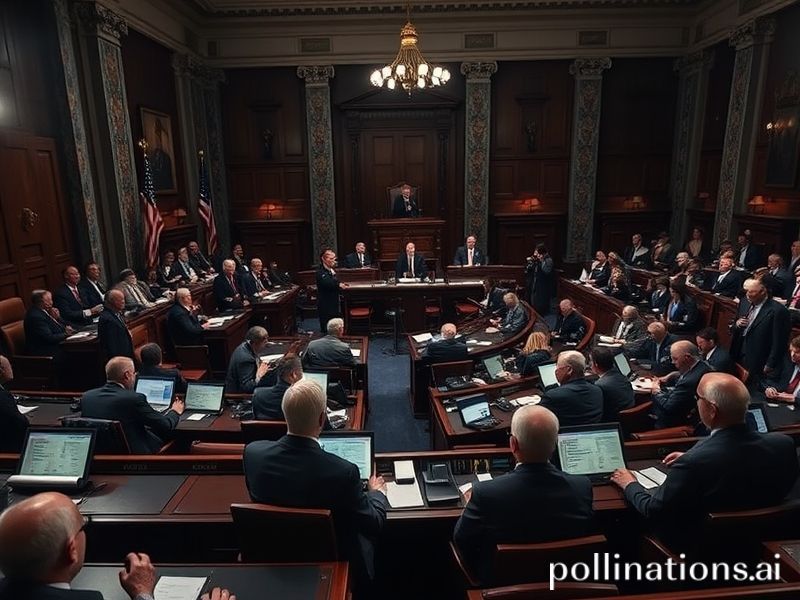Senate Showdown: Why the Government Shutdown Vote Has the World Glued to C-SPAN
# **Senate Showdown: Why the Government Shutdown Vote Has the World Glued to C-SPAN**
In a world where memes, TikTok dances, and AI-generated art dominate the headlines, you might wonder why a dry, bureaucratic event like a “government shutdown Senate vote” is suddenly trending globally. But here we are, folks—politics has once again crashed the internet party, and this time, it’s bringing the drama of a reality TV finale.
### **Why Is This Trending Globally?**
The U.S. government shutdown vote isn’t just a domestic squabble; it’s a spectacle that captivates the world. Why? Because when the world’s most powerful economy stumbles, the ripple effects are felt everywhere—from stock markets in Tokyo to coffee shops in Berlin. The shutdown vote is a high-stakes game of political chicken, and the world is watching to see who blinks first.
Social media has turned this into a global watercooler moment. Memes of lawmakers bickering like toddlers over a toy budget have gone viral. Twitter threads dissecting every Senate maneuver have millions of eyes glued to their screens. Even TikTok, the land of dance challenges and lip-sync battles, has seen a surge in political commentary—because, let’s face it, nothing brings people together like collective frustration with politicians.
### **Cultural Context: The Shutdown as a Cultural Phenomenon**
Government shutdowns aren’t new, but their cultural impact has evolved. In the past, shutdowns were met with shrugs and sighs, but today, they’re fodder for late-night comedy, think pieces, and even art. The shutdown vote has become a symbol of political dysfunction, a reminder that even in the digital age, old-school gridlock can still bring the internet to its knees.
The shutdown also highlights the growing disconnect between politicians and the people they represent. While lawmakers debate funding and policy, everyday citizens are left wondering how this affects their lives—from delayed paychecks to disrupted services. The shutdown has become a cultural touchstone, a shared experience that unites people across borders in their collective eye-rolls and memes.
### **Social Impact: Beyond the Headlines**
The shutdown vote isn’t just about politics; it’s about real people. Federal workers, small businesses, and communities rely on government services that grind to a halt during a shutdown. The social impact is immediate and far-reaching, from furloughed employees struggling to pay bills to travelers facing delays at airports.
But the shutdown also has a psychological impact. It fuels cynicism and erodes trust in institutions. When the government can’t even agree on basic functions, it’s hard for people to believe in the system. The shutdown vote is a stark reminder that democracy is messy, and sometimes, it feels like it’s breaking down.
### **What Makes This Topic Significant?**
The significance of the shutdown vote lies in its ability to capture the zeitgeist of our times. It’s a microcosm of broader issues—political polarization, economic uncertainty, and the role of government in people’s lives. The shutdown vote is a litmus test for how well (or poorly) our institutions can handle crises.
Moreover, the shutdown vote is a reminder that politics is never just local. In an interconnected world, what happens in Washington has global repercussions. The shutdown vote is a global story because it affects global markets, alliances, and perceptions of the U.S. on the world stage.
### **Conclusion: The Shutdown as a Cultural Reset**
As the Senate vote unfolds, it’s clear that the government shutdown is more than just a political drama—it’s a cultural reset. It’s a moment that forces us to confront the state of our institutions, the resilience of our economy, and the unity (or lack thereof) of our society. Whether you’re a meme-loving millennial or a policy-watching pundit, the shutdown vote is a reminder that politics, for better or worse, is always entertaining.
So, as the world watches the Senate vote with bated breath, remember: this isn’t just about budgets and bills. It’s about the story we’re telling ourselves—and the world—about who we are and what we value.
—







